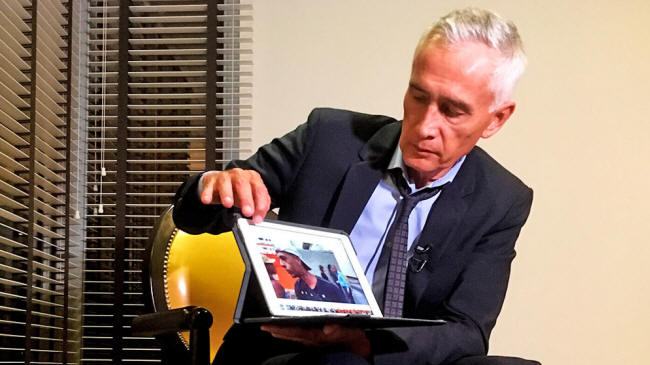|

by Alexander Rubinstein
June 12,
2019
from
MintPressNews Website
|
Alexander Rubinstein is a staff writer for MintPress
News based in Washington, DC.
He reports on police,
prisons and protests in the United States and the United
States' policing of the world.
He previously reported
for RT and Sputnik News. |

Univision's Jorge Ramos
shows a
video he says his crew shot the previous day
showing
Venezuelan youth picking food scraps
out of
the back of a garbage truck in Caracas,
during
an interview at a hotel in Caracas, Venezuela,
Feb.
25, 2019.
According to Ramos, Venezuelan President Nicolas Maduro
cut short an interview
when he showed Maduro the same footage
during the interview at Miraflores presidential palace,
before leaving two hours later
without having his crew's equipment returned.
Photo | AP
The
blatant lie told by Jorge Ramos
in the New York
Times
is part of a
larger trend in Univision's coverage,
which reaches 60
percent of American households
and makes
Univision
the largest
Spanish-language network
in the U.S.
MIAMI
Univision's
Jorge
Ramos, sometimes called the "Walter Cronkite of Latin America,"
flagrantly lied about his interview with Venezuelan President
Nicolas Maduro in February, the recording, which was leaked to
Univision
itself, reveals.
The network's reporting on other issues
surrounding Venezuela is also characterized by unprofessionalism and
overreaching, according to an account by one activist.
MintPress News
previously reported on the discrepancies in Jorge
Ramos' account of what happened during his U.S. government-approved
interview with Maduro.
Ramos said he was detained after the interview and was unable to
release it because his equipment was confiscated. Last week,
however, Univision
published the full interview.
Analyzing the footage in comparison with Ramos' account of what
happened reveals not just discrepancies, but outright lies.
Ramos
took to the New York Times op-ed section after he returned to the
United States, saying that it was a video he took of Venezuelans
dumpster diving that "broke" Maduro and caused him to end the
interview, confiscate his equipment, and detain him for three hours.
"The day before I had recorded on my cellphone three young men
looking for food on the back of a garbage truck in a poor
neighborhood minutes away from the presidential palace. I showed
those images to Mr. Maduro.
Each frame contradicted his narrative of
a prosperous and progressive Venezuela 20 years after the
revolution. That's when he broke.
About 17 minutes into the interview, Mr. Maduro stood up, comically
tried to block the images on my iPad and declared that the interview
was over."
The video from Univision directly contradicts that narrative,
however.
Ramos told Maduro that,
"Your revolution has failed
terribly."
Maduro begins to try to counter the claim by talking
about Venezuela's public safety net which includes free housing for
millions, and more.
Ramos then cuts Maduro off, who then wipes his
forehead in frustration.
https://twitter.com/RealAlexRubi/status/1137478346101678081
Looking at his laptop, Ramos then tells Maduro:
"Let me show you the
video of what I saw yesterday."
That's when Maduro ends the interview, telling Ramos,
"this interview
doesn't make any sense."
Maduro is already standing up and had
already told Ramos "see you later" by the time Ramos took his laptop
off his lap and attempted to show Maduro the video.
The blatant lie told by Ramos in the New York Times is part of a
larger trend in Univision's coverage, which reaches 60 percent of
American households and makes Univision the largest Spanish-language
network in the U.S.
Directing sources to lie
Following the stand-off over the Venezuelan Embassy in Washington,
one activist - who is unaffiliated with any of the groups that
supported international law and the democratically-elected
government of Venezuela's claim over the embassy in Washington - showed up to support the
Embassy Protection Collective's attempt to
keep the building out of the hands of Juan Guaido, the self-declared
president of Venezuela.
The activist was carrying a flag of a socialist government allied
with Venezuela when he was approached by a Univision reporter, the
activist told MintPress News, initially off-the-record.
In an apparent attempt to tie the anti-war women's group
CODEPINK to
supporters of the socialist government, the reporter asked the
activist whether she could interview them and asked whether she
could identify them as a member of CODEPINK.
The activist declined to identify as a member of the organization
because they are not one, but agreed to the interview. The reporter
took down the activist's phone number and told them that she needed
to check with her producer.
Later on, the activist got a phone call from the producer, who asked
if they were a member of CODEPINK.
The activist answered in the
negative, and so the producer asked whether they would identify as a
member of the group anyways. Once the activist refused again,
Univision cancelled the interview.
Univision is a powerhouse in Spanish media, as is Ramos, while the
embassy standoff was a major proxy conflict in the larger coup
attempt.
These narratives paint a grim portrait of the lengths to
which Univision will go in violation of standard journalistic ethics
in order to get a story that could help manufacture consensus in the
U.S. for further conflict with Venezuela.
|


